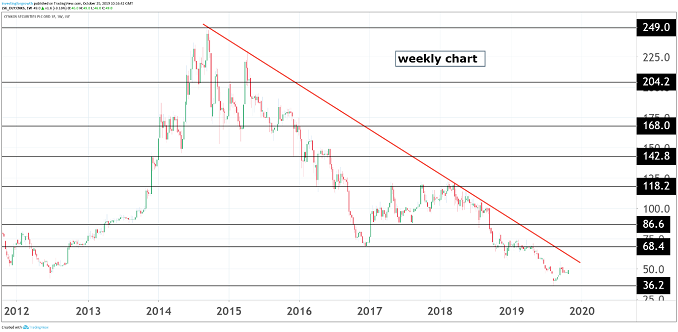Stockwatch: A near double-digit yield that might just hold
Removing the uncertainty around Brexit and elections could provide a big boost to this small-cap share.
29th October 2019 10:16
by Edmond Jackson from interactive investor
Removing the uncertainty around Brexit and elections could provide a big boost to this small-cap share.

Capitalised at around £27 million, AIM sponsor and stockbroker Cenkos Securities (LSE:CNKS) is near the low end of market cap I would engage for these pieces. But it reflects a de-rating from £113 million in the last five years as supply/demand for smaller company flotations have contracted, and also the market ratings of their sponsors.
Yet the numbers suggest Cenkos remains the leading corporate broker for AIM and, while this market has substantial disappointments, I doubt it's going away. Despite fluctuations there has always been demand for a specialist small-cap forum, such as in the 1980's Unlisted Securities Market.
In such context I have a buying hunch: where a stock has reached net asset value (NAV) that isn't inflated with goodwill/intangibles; the business is a leader with a good chance of long-term recovery; a low capex, high cash flow profile is supportive of dividends; and several directors are buying.
Hinges significantly on a general election outcome
This seems a particularly sensitive UK domestic play. If Boris Johnson can get an election and a working majority to push through his EU withdrawal agreement, it could start to lift the uncertainty dogging major financial decisions (like flotations).
But if his attempts are thwarted, or his gamble backfires – resulting in a hung parliament where the EU plays the UK for time and Brexit becomes a never-ending saga – then 2020 could yet be a grim prospect. We're told how political uncertainties have put investment decisions on hold, which impacts flotations and equity capital-raisings.
Reflecting a tough environment, rival Shore Capital (LSE:SGR) declared last month it would de-list from AIM given "lack of liquidity and a substantial discount to NAV at which the shares trade."
It's a relatively controlled company though, its directors having increased their ownership from 53% over 67% - the free float at Cenkos is around 68%. They say the cost/benefit is no longer worthwhile. Bear in mind this kind of move does not imply a bid premium: Shore shares fell from 185p to below 140p given their liquidity is drying up, though have since recovered to 170p.

Source: TradingView Past performance is not a guide to future performance
Cenkos has buckled down for hard times
September's interims showed Cenkos has cut staff costs by 50% to £6.5 million for the first half year, albeit still showing the dilemma of how smaller listed financial companies have the airs of a private partnership. Databases cite 110 employees, implying the average annual compensation (before share-related bonuses) near £120,000.
It meant that with "other" stickier admin expenses at £4.3 million, a 41% fall in first-half 2019 revenue to £10.6 million resulted in a £200,000 pre-tax loss (versus £500,000 profit, like-for-like).
Corporate finance fees represented 64% of fee income and fell by 48%, while in second place the relatively recurring income from nominated advisor (nomad) fees was flat. In third place, research fell 39% due to a squeeze on commission rates and a cut in buy-side research budgets. Net trading gains also fell 56% to £921,000.
Hence, there's a "feast-or-famine" reputation for corporate broking, and is why at 47.5p the stock trades on around 8 times 2018 normalised earnings and other brokers have given up providing any forecasts. As things stand, while revenue for 2019 as a whole was guided lower (than 2018) at September's interims, "the second half has started well with a number of transactions including an IPO... Cenkos has completed 2 of 7 recent transactions, demonstrating we remain the leading AIM broker."
Dividend sustainability is the near-term crux – also crutch
Despite the modest interim loss, the board saw fit to maintain a 2p interim dividend which costs £1.1 million versus £14.7 million cash at end-June. While balance sheet cash has fallen from £21.7 million mid-2018, Cenkos' narrative proclaims "a healthy capital surplus of £15.9 million (2018: £12.0 million) above its Pillar 1 (regulatory) capital requirement."
Databases show 6.5p paid for the 2018 year, but they tend to be based on the timing of payouts than the period they are described (in company reports) to respect. So, Cenkos' accounts show a 2p interim and 2.5p final in respect of 2018. If a 4.5p payout can be sustained, then, at 47.5p, the stock is presently on a 9.5% yield – as if pricing in some extent of cut anyway.
They say the deals pipeline is fair and their cash cushion is evident. So, if Boris Johnson can wrest a way out of political quagmire, it is possible that both the dividend is maintained and it de-risks somewhat – i.e. the stock rises.
| Cenkos Securities - financial summary | ||||||
|---|---|---|---|---|---|---|
| year end 31 Dec | 2013 | 2014 | 2015 | 2016 | 2017 | 2018 |
| Turnover (£ million) | 51.4 | 88.5 | 76.5 | 43.7 | 59.5 | 45.0 |
| Operating margin (%) | 20.6 | 30.3 | 25.8 | 11.4 | 16.8 | 6.8 |
| Operating profit (£m) | 10.6 | 26.8 | 19.8 | 5.0 | 10.0 | 3.1 |
| Net profit (£m) | 8.6 | 21.3 | 15.4 | 2.5 | 7.2 | 2.4 |
| IFRS3 earnings/share (p) | 14.2 | 32.0 | 25.9 | 5.8 | 15.0 | 4.3 |
| Normalised earnings/share (p) | 14.2 | 32.0 | 25.9 | 5.8 | 16.0 | 6.4 |
| Operating cashflow/share (p) | 21.9 | 18.0 | 45.0 | -8.0 | 34.9 | 5.4 |
| Capital expenditure/share (p) | 0.2 | 0.6 | 0.3 | 0.5 | 0.7 | 0.5 |
| Free cashflow/share (p) | 21.7 | 17.4 | 44.7 | -8.5 | 34.2 | 4.9 |
| Dividend/share (p) | 12.0 | 17.0 | 13.0 | 2.0 | 9.5 | 6.5 |
| Covered by earnings (x) | 1.2 | 1.9 | 2.0 | 2.9 | 1.6 | 0.7 |
| Cash (£m) | 44.0 | 42.8 | 46.3 | 38.1 | 47.4 | 45.5 |
| Net Debt (£m) | -44.0 | -42.8 | -46.3 | -38.1 | -47.4 | -39.5 |
| Net assets per share (p) | 41.1 | 62.1 | 50.4 | 47.9 | 52.5 | 48.7 |
| Source: historic Company REFS and company accounts |
Non-executive directors are buying
After Cenkos came out of its interim results closed period on dealings last 18 September, a non-executive director added 12,347 shares at 48.5p to own 63,235 overall. A day later another non-exec bought an initial 20,000 shares at 51.75p. While they can't have a crystal ball as to flotations' deal-flow, I regard this as sensible long-term investing in a period of weak sentiment.
Yes, the table and interim results shows Cenkos' operating margins have been decimated from a 20-30% range, but this shows an aspect of operational gearing. Unless you believe AIM faces demise, then periods like now are opportune to accumulate equity.
The employee benefit trust (EBT) continues an active buyer, most recently 50,000 at 48.5p on 17 October and has accumulated a total 1,877,503 shares. I wouldn't draw big conclusions for perceived value, as once set up an EBT is going to make regular purchases in order to meet share awards. Technically though it may be something of a prop, helping explain why Cenkos shares trade at around net asset value while Shore complains of a big discount.
Attractive business model when the going is good
Uninspiring the current situation may be, and it is possible that Cenkos (and other small cap brokers) take flack if the financial environment worsens to expose troubles at smaller listed companies under their wings. Yet the table and accounts show a business that needs little by way of capital expenditure or debt (see the big differential versus cash flow per share over years, also net debt figures being the inverse of cash reserves), which means a useful business for generating payouts in the fair to good years.
A potentially worrying sign last week was insolvency services group alleging "a 40% rise in UK businesses in significant financial distress since the 2016 Brexit referendum".
Although as a long-term follower of Begbies Traynor's reports I would say they have warned repeatedly at the extent of "zombie" companies, i.e. over-indebted UK firms. These largely originated in the run-up to 2008 crisis and were kept on life-support by the monetary stimulus years, but were always on the ropes.
So Begbies is indulging an aspect of political jest to imply the 40% hike is "due to Brexit". The polar opposite economics view would say a good many such businesses should have gone bust years ago if markets were working effectively.
I wouldn't hold my breath for business confidence to improve radically, although financial shares in particular can turn up from lows, simply in anticipation of this.
Cenkos exemplifies a situation where you might test the idea with a small purchase and review it according to developments. Buy.
Edmond Jackson is a freelance contributor and not a direct employee of interactive investor.
These articles are provided for information purposes only. Occasionally, an opinion about whether to buy or sell a specific investment may be provided by third parties. The content is not intended to be a personal recommendation to buy or sell any financial instrument or product, or to adopt any investment strategy as it is not provided based on an assessment of your investing knowledge and experience, your financial situation or your investment objectives. The value of your investments, and the income derived from them, may go down as well as up. You may not get back all the money that you invest. The investments referred to in this article may not be suitable for all investors, and if in doubt, an investor should seek advice from a qualified investment adviser.
Full performance can be found on the company or index summary page on the interactive investor website. Simply click on the company's or index name highlighted in the article.
Disclosure
We use a combination of fundamental and technical analysis in forming our view as to the valuation and prospects of an investment. Where relevant we have set out those particular matters we think are important in the above article, but further detail can be found here.
Please note that our article on this investment should not be considered to be a regular publication.
Details of all recommendations issued by ii during the previous 12-month period can be found here.
ii adheres to a strict code of conduct. Contributors may hold shares or have other interests in companies included in these portfolios, which could create a conflict of interests. Contributors intending to write about any financial instruments in which they have an interest are required to disclose such interest to ii and in the article itself. ii will at all times consider whether such interest impairs the objectivity of the recommendation.
In addition, individuals involved in the production of investment articles are subject to a personal account dealing restriction, which prevents them from placing a transaction in the specified instrument(s) for a period before and for five working days after such publication. This is to avoid personal interests conflicting with the interests of the recipients of those investment articles.